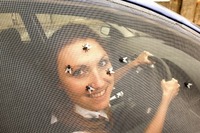Bee-careful: 650,000 car accidents caused by insects
 Over half a million motorists have had a car accident thanks to distractions caused by insects and bugs, totalling an estimated £44 million of car damage each year. And with an Indian summer predicted this year, motorists are bee-ing urged to take caution and take steps to prevent insects from causing an in-car commotion.
Over half a million motorists have had a car accident thanks to distractions caused by insects and bugs, totalling an estimated £44 million of car damage each year. And with an Indian summer predicted this year, motorists are bee-ing urged to take caution and take steps to prevent insects from causing an in-car commotion.esure car insurance questioned over 1,000 motorists to find out the top summer driving distractions and insects proved to cause the second biggest disturbance. Three quarters (75 per cent) of drivers revealed that rogue bugs drove them to distraction, so much so that over a million (four per cent) motorists admitted to slamming on the brakes when an insect flew into their car. Worryingly, an additional fifth of motorists (21 per cent) said they took their hands off the wheel to either swat or flick out an unwanted bug.
Having experienced a warm and wet summer, experts are warning of an infestation of flying insects such as mosquitoes, giant hornets, ladybirds, midges and daddy long legs. esure predicts it may see an increase in car insurance claims over the coming weeks from accidents caused by in-car distractions. In an effort to protect insect-phobic motorists, esure has created a ‘spider web’ which can be fixed over an open car window – to act as an insect protection net – to keep unwanted winged passengers from invading motorists’ in-car space.
Mike Pickard, Head of Risk and Underwriting at esure, said: “With an influx of insects expected to hit the UK, it’s worrying that over three quarters of the driving population are so easily distracted by bugs when they’re behind the wheel. Motorists are panicking and are not only losing their concentration but also control of their cars – putting themselves and other road users at risk.
“We’re always looking at ways to help drivers reduce the likelihood of having an accident and these car insect nets could help to make the roads safer this summer. And the three per cent of drivers who never wind down their window in fear of an insect flying in, would be able to experience fresh air whilst driving for the very first time.”
Gender divide
Female motorists tended to be more distracted by insects whilst driving (78 per cent) than men (70 per cent). However, men admitted to having more insect-related accidents than women. Interestingly, more women were concerned about having an allergic reaction if bitten or stung by an insect, whereas more men than women (over two thirds) cited pain when asked about their concerns.
Insect phobias
The research also revealed that over half of motorists (51 per cent) have either never been stung before or haven’t been stung over the last ten years and it is the fear of possibly having a serious allergic reaction which is causing drivers to get so distracted by unwanted passengers. Wasps were the most feared in-car insect (52 per cent) with hornets second (14 per cent).
Professor Alex Gardner, Chartered Psychologist and phobia specialist, said: “The symptoms of an insect phobia can be significantly heightened when driving a car, as feelings of fear and anxiety intensify when one is locked in an enclosed space, producing the potential for a severe phobic response and considerable level of panic.”
Regional fears
Brummie motorists proved to be worst affected by insect-related distractions (87 per cent) closely followed by drivers from the North West (85 per cent). However, those living in Yorkshire and Humberside should be most wary as six per cent confessed to slamming on the brakes in the event of an insect flying into their car. Londoners proved to be the most tolerant with 16 per cent managing to safely ignore unwanted in-car insects all together.
esure has put together some top tips to help drivers stay safe when faced with an insect in the car:
Slow down and keep your eyes firmly on the road – and not on the insect.
Pull over as soon as it’s safe to do so and open all the doors and windows to allow the insect to escape on its own accord.
If you can’t park the car quickly and safely, fully open all the windows to allow the insect to fly out.
Try not to panic and swat the insect or wave your hands around to force the insect away. As well as making you feel more frantic, this will irritate the insect and increase the likelihood of a sting or bite.


